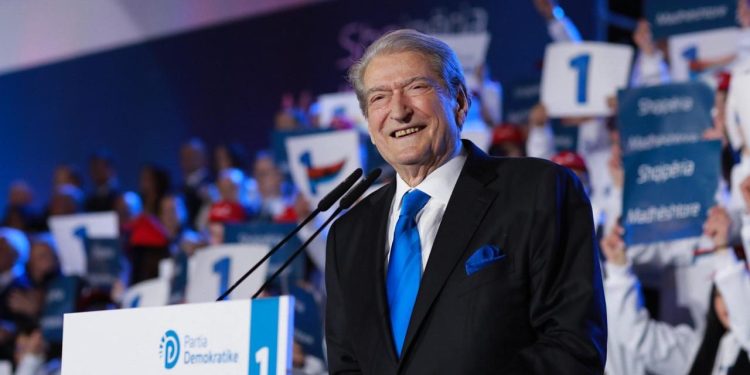Albania’s Democratic Party engulfed in $6 million lobbying scandal

Photo: Sali Berisha, Chairman of the Democratic Party of Albania.
Albania’s Democratic Party (PD) finds itself in the midst of a major financial scandal less than two weeks before the May 11 elections, after revelations that it signed a $6 million lobbying contract with a Washington-based firm closely tied to former President Donald Trump’s political network. The source of the funds remains murky, raising sharp legal and ethical questions.
Why is this important: The controversy hits PD at a critical electoral moment, undermining its claims to transparency and reform. It highlights persistent concerns over political financing in Albania, and the apparent use of extraordinary resources to address a leader’s personal legal challenges. It also carries the risk of serious legal repercussions, both domestically and internationally, if violations of transparency and funding laws are confirmed.
Context: The documents, whose revelation seems to have caught the Democratic Party off guard, reveal that a contract was signed on April 4 with Continental Strategy, agreeing to pay $250,000 a month for two years. The firm, led by former U.S. diplomat Carlos Trujillo, is tasked with lobbying U.S. government officials, promoting Albanian democratic reforms, and addressing “legacy issues”—widely understood to mean Sali Berisha’s U.S. “non grata” designation over alleged corruption.
Faced with media exposure, PD officials claimed the funds come from patriotic donations through a little-known entity, the “Make Albania Great Again” foundation. However, no public record of the foundation’s existence has been found.
The contract bears the signature of PD Secretary General Flamur Noka. The listed guarantor is Nuredin Saci, an Albanian-American resident in New York, whose ability to secure $6 million for political lobbying is unclear and under question.
Observers have drawn immediate parallels with a 2017 scandal, when PD under Lulzim Basha arranged a $500,000 payment to a shell company linked to Russian interests. Then, Berisha demanded Basha’s prosecution. Now, Berisha himself faces similar accusations of opaque fundraising and potential legal exposure.
Rama’s reaction: Prime Minister Edi Rama seized on the controversy at a rally in Vlorë.
“It is absurd that a political party pays more money to fix one man’s personal legal issues than what the state gives to all parties combined,” Rama said. He added, “They said when Trump returns, Berisha’s problems will be solved. Now they are paying $6 million for a miracle. This is not the issue that concerns Albanian citizens.”
Rama framed the scandal as a clear signal that PD serves personal, not national, interests.
Berisha and PD’s response: The Democratic Party defended the contract as legal and registered under U.S. transparency regulations. In a statement, it said the funds were raised entirely by “patriotic Albanian-Americans” who oppose Edi Rama’s rule. PD accused the government of using the scandal to distract from its own corruption. “The lobbying contract terrifies Rama and his associates because the Democratic Party’s denunciations are finally being heard in Washington,” the party stated.
Sali Berisha has reiterated claims that his “non grata” status is politically motivated, framing the lobbying efforts as necessary to restore Albania’s standing with U.S. institutions.
Ethical concerns: The scandal underlines major ethical issues.
- Spending $6 million—four times PD’s annual public funding—on lobbying efforts for the benefit of one individual, raises questions about the party’s true priorities.
- The opacity surrounding the “Make Albania Great Again” foundation further deepens concerns about illicit funding.
- Under Albanian law, political donations must be transparently declared, and hiding behind a shell foundation is illegal.
Commentators stress that PD’s insistence on secrecy mirrors the very practices Berisha once condemned. Critics argue that rather than focusing on national renewal, DP appears to have redirected its energy—and finances—toward the rehabilitation of its embattled leader’s personal reputation abroad.
What’s next: Preliminary verifications into the funding origins are underway. Whether legal consequences will follow remains to be seen. For now, the scandal threatens to dominate the final days of the election campaign, leaving DP to battle on two fronts: against the government, and against the shadow cast by its own financial practices.


